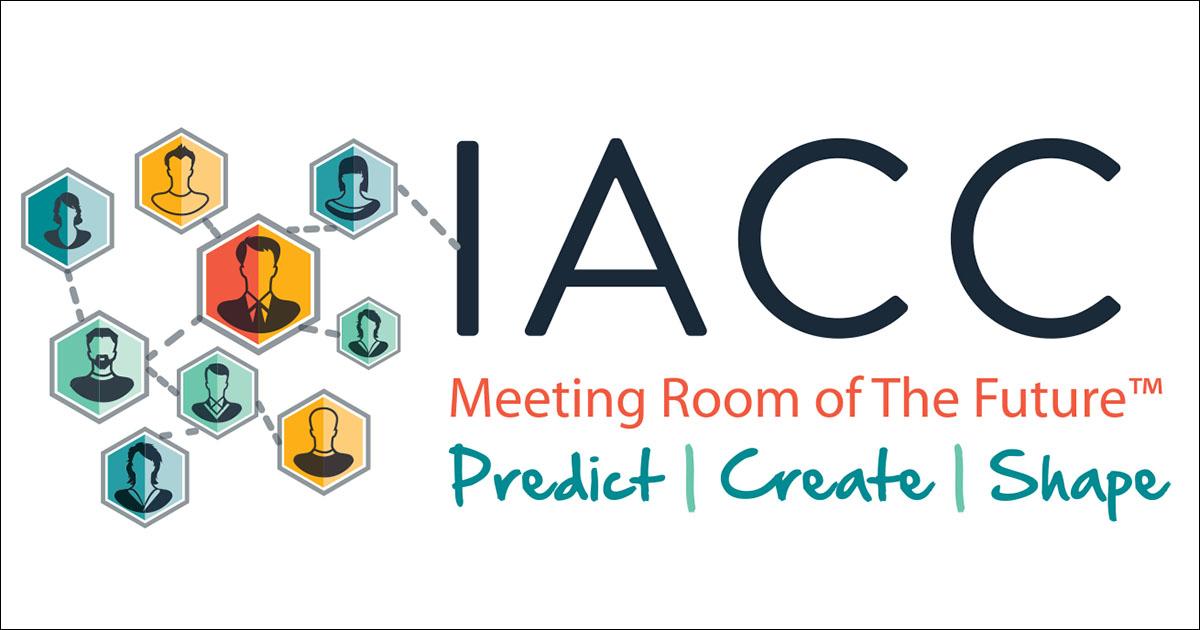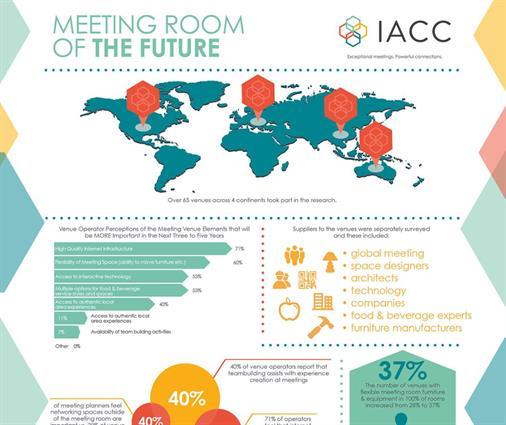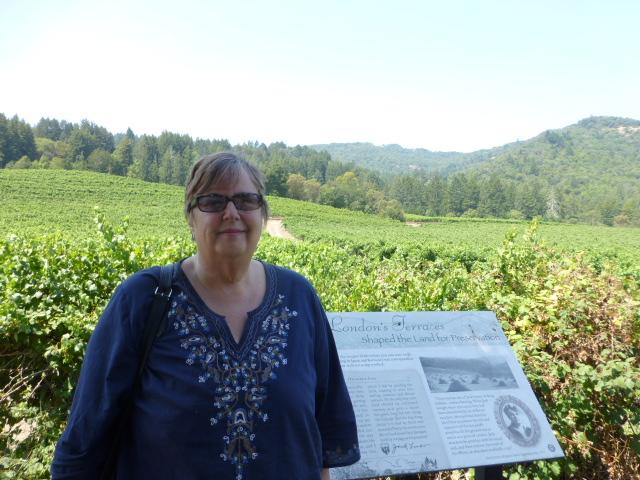Graphics courtesy of IACC
When it comes to providing an environment conducive for attendee engagement and customized experiences, venue managers have an increasingly important role to play. This message is woven throughout “IACC Meeting Room of the Future,” a comprehensive study looking at how venue operators are or should be staying on top of trends in meeting space design, technology, food service and other elements crucial to keeping conference facilities viable in a changing marketplace.
The IACC-led initiative sought input from operators of more than 50 venues across four continents, focusing on those where meetings, conferences and training comprise from 50 percent to 100 percent of their business. Suppliers to the venues also weighed in, including meeting space designers, architects, technology companies, nutritionists and furniture manufacturers.
Experience Creators
Citing the fact that experience creation is a growing focus for meeting planners, the study asked venue operators if they view this as their role as well. Some 93 percent of the operators answered “yes” or “sometimes” to the question.
That such a sizeable majority do see experience creation as part of the job came as no surprise to Mark Cooper (MPI Chicago Area Chapter), CEO of IACC.
“Venue owners and operators have seen roles change and evolve and we expect further changes in the next three to five years,” he says. “The role of the venue has changed as it relates to the elements required to create a bespoke set of experiences which will add value to the meeting. We used to call the venue planning team coordinators, but now they are consulting partners and experience creators with responsibilities that get to the heart of the event’s success.”
At the same time, the study reported a slight increase (3 percent) over the year before in the number of operators who said their role does not include experience creation. Noting that many event budgets are not keeping pace with rising costs, the study found this trend slightly troubling in that planners are relying more heavily on venue partners “to help make choices that will maintain the integrity of their brand and experiences and education programs.”
Space and Design
When it comes to trends in meeting spaces, flexibility is king, with 60 percent of operators saying that flexible spaces will become more important over time. Many respondents reported increasing demand for breakout space conducive for networking and for a wider variety of furniture, including sofas, armchairs, foldable tables and lightweight furniture for easy mobility.
According to Cooper, increasing preferences for non-traditional set-ups and furnishings mirrors what is happening in society at large.
“Home working has led to us to being comfortable with the fact that we do not need uniformed/functional spaces to do our job well,” he says. “Look at the environments in our personal lives, restaurants, café’s etc. where we see more creative seating areas. We seek collaborative exchanges with colleagues and flexible layouts facilitate this. In the past we have been too accepting of inflexible spaces at venues because that is all that was on offer.”
Jessie States, manager of professional development for MPI, believes that traditional room set-ups, furnishing and décor often fall short of today’s meeting requirements and objectives.
“The ways people learn and engage are shifting, and our design and décor need to reflect that, and indeed support it,” she says. “Venues that provide spaces that help people learn with and from one another, meet the precisely right partner or expert and problem solve together demonstrate a competitive advantage in the marketplace.”
Technology
For many venue operators, technology poses by far the most difficult investment choice, according to the study.
“Venue managers, just like meeting planners are faced with seeing an endless array of technologies being introduced,” Cooper says. “Navigating through these to find the ones which will be embraced by their clients and add value can be daunting. If the wrong choices are made, it can be an expensive mistake.”
A majority of venues reported offering increased collaborative technologies to their clients, including virtual reality and screen-sharing. But while video conferencing hardware continues to be the main form of collaborative technology that venues offer, operators reported a significant decrease in demand and some even cited it as an investment that did not pay off. A majority of venues also cited smartboards as a technology investment not worth the cost.
“In this research, one group CEO operating 15 venues, cited past video conferencing hardware investments as being ‘a waste of money,’ with them sitting in the corner unused,” Cooper notes.
When it comes to internet quality and bandwidth, areas of utmost concern to planners and delegates, the study noted there is little doubt that investment in this type of technology is worth the cost. Some 52 percent of venue operators said they are planning to invest more in bandwidth over the next 12 months.
Food for Thought
Trends toward sustainable practices and healthy menu choices are increasingly
high priorities for venues, according to the study. Some 90 percent of venue operators reported that they are more committed to sustainability than they were three years ago, while 87 percent said they are implementing more health and well-being initiatives.
When it comes to healthy eating, 77 percent said the concept is reflected in their food and beverage service and 62 percent said they have made significant changes overall to their offerings. Many respondents reported an increased emphasis on providing seasonal, locally sourced vegetables as well as house-made artisanal items made with wholesome ingredients.
The study also noted the challenge of devising menus that please an increasingly particular and complex audience.
“Both venues and planners have to get better at managing the huge shift in personal dietary requirements and the management of these,” Cooper says. “If we are including one open text box asking for dietary requests, be prepared for a long list of requests. We have to be better at capturing separately, the ‘need to have’ requests which affect the health of the delegate, from the ‘nice to have’ requests. Having a structured well worded way of capturing and conveying requests will be good for both planner and venue in the long term.”




